Last week I saw a Facebook post that stated the government plan to deal with the COVID-19 crisis is a good one, but the people lack discipline. I stopped and re-read it several times, wondering whether or not it was sarcasm. I waited for people to comment, interested in the conversation it would spark. People seemed to, for the most part, agree with the statement.
To say I disagree would be generous because I do not even believe what we have seen thus far from the government is a plan. We have seen the introduction of individual measures. They do not stem from a strategy and do not work together within a solid, cohesive design. If a strategic plan was in place, we would not have had a grocery schedule introduced just hours before a five-day lockdown was announced. Surely the people designing the plan would have predicted the chaos we saw at every major grocery store in New Providence. At the very least, measures would have been put in place to ensure people were able to practice social distancing as they waited to enter the grocery stores. This is not what happened.
There are four major issues with the way the COVID-19 crisis is being addressed by the government. The first is it does not consider and respond to the needs of vulnerable people. Measures put in place to protect our health end up disproportionately disadvantaging vulnerable people. An easy example is the arrest of the unhoused people for breaking curfew. If the government considered vulnerable people, it would have opened emergency shelters, invited people without homes to stay in them and advised police to transport them to the nearest available shelter instead of criminalizing homelessness when they are found on the street during curfew.
The second is that these short periods of lockdown followed by, essentially, large public gatherings as people panic in clusters at grocery stores in the attempt to prepare for the next lockdown period is like hitting a reset button.
According to last week’s address, we will be doing this over and over again, at least until the end of April. We stay home for a couple of days and this reduces the spread. We go out again in a rush, trying to get essential supplies (and yes, some use it as an excuse to be out and about), and end up in crowds, likely with asymptomatic people who are spreading COVID-19.
It would make more sense to give everyone time to prepare and have a longer lockdown. The government is probably delaying this because of the first issue – it is obligated to meet the needs of vulnerable people. There can be no extended lockdown before the government ensures there is food security. We know some can only afford to purchase a few items at a time. They need to be provided with food before grocery stores can be closed to the general public for an extended period. Is the government prepared to do this?
The third issue is the expectation that businesses bear the burden of enforcement. Last week, grocery stores were not given systems or clear operational instructions for compliance with the emergency order given the sudden changes. They were expected to, overnight, figure out how to manage large crowds with their existing staff. Law enforcement officers were not routinely stationed at grocery stores to help maintain order. The simplest suggestion – to give numbers and have people wait in their cars – was not made by decision-makers. Small adjustments can make a big difference and there would be less to correct and remedy with more input from experts and practitioners. Organizations that managed hurricane relief, for example, can offer tactics and solutions that have proven effective, but that would require consultation.
The fourth issue with the current approach is the assumption people – including those considered low-risk – will comply. This requires a sense of personal responsibility for what occurs within our communities. Whatever we like to think, we do not have this in high volume. We have a lot of work to do to properly build strong communities with members who actively care about and look after each other. People who do not care about each other’s wellbeing do not just comply. Until we build the kind of community we want, we need better guidelines and systems that work to enforce them.
I’ve learnt a structured day is important to me
It feels as though we have been at home for a long time. Relative to other countries, it has not been very long at all. We are likely at the very beginning. Not only that, but what we have done thus far is probably nowhere near what is needed. There will be more time at home and it is in our best interest to not only comply, but take some time to make decisions and create systems that will make it easier for us. Going with the flow may work for some, but others will be completely lost, frustrated, or largely unaffected until they realize how much time has been lost. We each have to figure out what works best for us, and that may require some trial and error.
I have experimented a bit on my own, tried different approaches and arrived at the conclusion that structure is important for me. I want to wake up early, do most of my cooking and baking before the hottest part of the day, check on family members, work on at least one of my projects, catch up with a friend, spend time in the yard and start winding down at a reasonable time every day.
Some people can work with a to-do list and check tasks off as they go, but I prefer to put tasks into time slots. I set time aside for meal preparation, phone calls, leisure activities, work tasks, household tasks and anything else that needs my attention. This is, of course, helpful when I need to schedule meetings and set times for calls with friends in different time zones. It helps that I am disciplined and used to working from home, but there is always temptation to stray from the plan. For some, it feels better to leave the day open and take on tasks at will. We all have different needs and they may have changed given the circumstances, so give yourself a chance to figure it out.
Even if you do not like structure, it is a good idea to set your non-negotiables. What are the things you will not let yourself do or fail to do? It does not have to be as strict as getting up at five o’clock in the morning, but it can be helpful to set eight o’clock as the absolute latest you will stay in bed. That way, you have a window of time within which to get up and you can give yourself varying amounts of wiggle room depending on the day you have ahead of you. It may be a good idea to set alarms for your mealtimes, especially if you are on a particular diet.
Time can go incredibly slowly or surprisingly quickly when you are in a different environment and missing the time queues you usually get when there are coworkers in your physical space. You could end up having lunch at ten o’clock in the morning or completely forgetting about it if you’re not paying attention. Based on what is important to you, experiment with different types of schedules until you find the right fit.
Books can help us escape
Whether you have a lot of free time or not, it is important to have something other than work to fill your days. There are new shows popping up on Netflix all the time, social media challenges, virtual parties with top DJs and live sessions with celebrities and professionals in a range of fields. One of my favourite ways to spend my time is reading. I have three fiction books to recommend.
Little Fires Everywhere by Celeste Ng is a portrait of characters. It opens with the Richardsons’ home on fire and their youngest child missing. Rewinding, Ng tells the deeply personal story of a mother and daughter – Mia and Pearl Warren — who move into the same suburbs as the Richardson family and rent one of their duplex apartments. The entire book is backstory, digging into past experiences of primary and secondary characters, but it remains clear which characters are the focus. Just as you settle into the stories of the Richardsons and the Warrens, there is an adoption, a missing baby, a ruckus, and a court case with different characters. Ng is skilled in bringing characters to life, making the reader care, and blurring the line between right and wrong. If you read and love this book, pick up Everything I Never Told You and let Celeste Ng bring you into a world of fascinating, yet ordinary characters for a second time.
With the Fire on High closely follows Elizabeth Acevedo’s The Poet X. Both are young adult novels that remain true to difficult circumstances without a heavy-handed approach or excessive focus on a moral. With the Fire on High follows Emoni Santiago as she navigates the challenges of high school, motherhood, and helping her grandmother to make ends meet. She is passionate about cooking and everyone enjoys her food. Her strength becomes a challenge when she takes a cooking class at school that requires everyone to follow the rules, no matter how good their intuition may be. This is the perfect book to read with a teenager. It is sure to spark conversations about family life, career choices, friendship, and the transition to adulthood.
Queenie by Candice Carty-Williams has been referred to as the “black Bridget Jones,” but the comparisons are only at the surface. Carty-Williams using Queenie’s life experiences as commentary on issues of race, gender, migrant cultures, and the continued effects of slavery. Queenie is easy to like. The opening of the novel is deceptively light-hearted and simple, so when it turns to heavy themes such as mental health issues and unhealthy relationships, it is a bit surprising. By that time, the reader has a relationship with Queenie and can’t help but to root for her, even when she makes terrible decisions. Queenie is a like a cousin or a friend from high school. She will annoy you, but you want the best for her anyway.
If you are looking for more books and recommendations for other activities, follow Equality Bahamas on Facebook, Twitter, and Instagram. Our team is sharing book, tv show, movie, music, TedTalk, and Tiny Desk concert recommendations almost daily. Every now and then, we all need an escape.
Published by The Tribune on April 15, 2020.



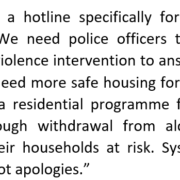
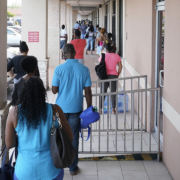

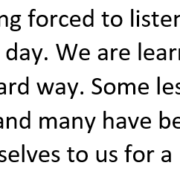
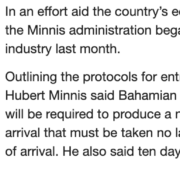
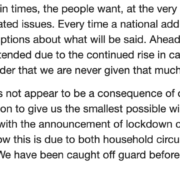



Leave a Reply
Want to join the discussion?Feel free to contribute!